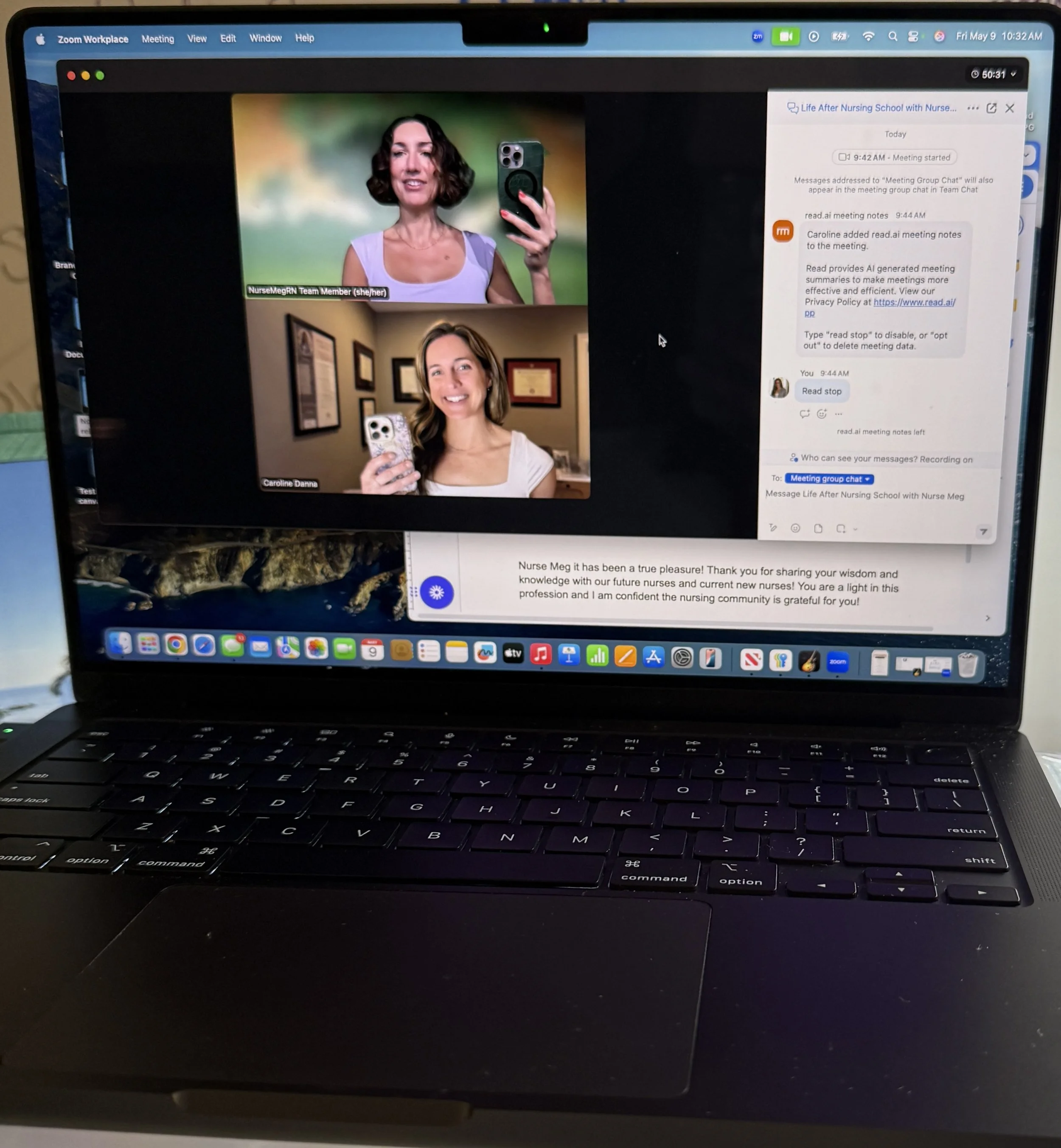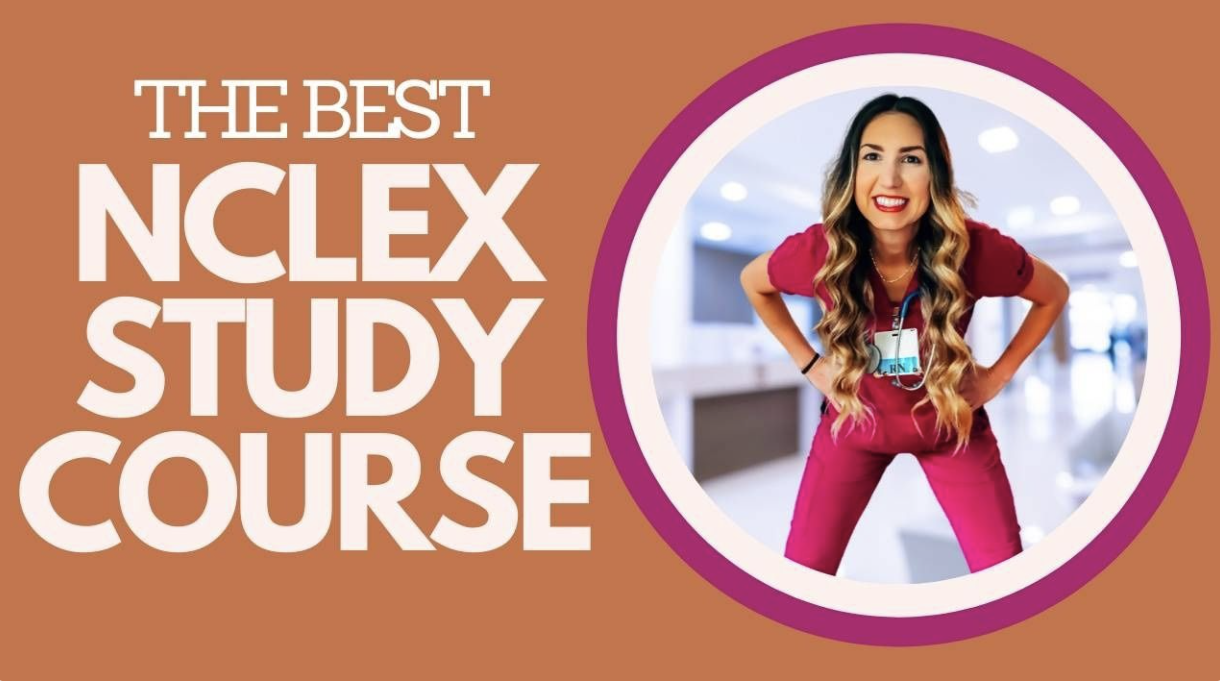From Bedside to Breakthrough: Nurse Meg RN on Mastering the NCLEX & Thriving as a New Grad Nurse
Welcome back to another blog post, where we help bridge the gap between the classroom and the clinical floor. Today, we’re sitting down with a true force in the world of nursing education—Nurse Meg RN, also known as Meg Harrel.
With a combined social media following of over 1 million across TikTok, Instagram, and YouTube, Meg has quickly become one of the most influential voices for nursing students and new grad nurses. Through her educational content, bedside tips, and NCLEX preparation support, she’s helping thousands of future nurses feel more confident and capable as they step into practice.
If you’re a nursing student, a new grad feeling overwhelmed, or even a nurse educator wondering how to better support your students, this conversation is for you.
The Journey: From LPN to Nursing Educator Entrepreneur
Meg’s nursing journey spans over 16 years and started with an LPN program—mainly because she couldn’t get into an RN program right away and wanted to avoid taking on massive student loans. She worked as an LPN, completed a bridge program to become an RN, later earned her BSN, and eventually transitioned into education and mentorship.
Like many of us, Meg’s trajectory changed dramatically in 2020.
“It was a very scary time to be a nurse,” she said. “New grads were getting two to three weeks of orientation and were thrown right into patient care. It was terrifying.”
That experience inspired her to start her blog and social media platforms to provide free, practical resources for struggling nurses—like report sheets, flow charts, and eventually NCLEX tutoring.
Today, Nurse Meg RN’s resources have reached over 500,000 nurses. Her course, The Best NCLEX Study Course, boasts a 99.9% pass rate and continues to help students reduce anxiety and pass the NCLEX with confidence.
The Gap Between Nursing School and Real Life
One of the main reasons Nurse Meg created her platform was to address a major disconnect she noticed: the gap between nursing school knowledge and real-life nursing practice.
“When I graduated, I thought I was prepared. I did well in school, loved clinicals—but once I got to the floor, I felt like I knew nothing,” Meg shared.
So what exactly is that gap?
According to Meg, it boils down to two things:
Communication Skills – Giving report, talking to doctors, and finding your voice as a nurse.
Time Management – Knowing how to structure a 12-hour shift, prioritize tasks, and avoid staying late charting.
These are skills that aren't often taught in nursing programs but are critical to surviving those first few months as a new grad nurse.
A Fresh Approach to NCLEX Prep
Let’s talk about the exam every nursing student dreads: the NCLEX.
If it’s been a few years since you took it, or you’re preparing to take it soon, you might not know that the NCLEX underwent a major overhaul in 2023 with the launch of the Next Generation NCLEX (NGN).
Here’s a quick breakdown Meg gave us:
The test now includes case studies and EMR-style formats to mirror real clinical decision-making.
Select-all-that-apply questions are now scored based on individual choices—not all-or-nothing.
There’s a new scoring algorithm that weighs critical thinking and clinical judgment.
You’ll receive 15–20 unscored questions designed to test future exam items.
The test ranges from 85 to 150 questions, depending on performance.
Meg pointed out that traditional test prep companies often miss the mark because their materials aren’t written by experienced nurses—they’re written by general test writers.
“The NCLEX is written by nurses with 10–15 years of experience. That’s a completely different mindset. You can’t prepare with cookie-cutter practice questions and expect to succeed.'“
Common NCLEX Mistakes & How to Avoid Them
According to Meg, the most common NCLEX prep mistakes include:
Only using practice questions – Students skip content review and don’t build the foundational knowledge they need.
Studying too long each day – Neuroscience shows that more than 3 hours of study in one sitting can reduce retention.
Dragging out studying for months – The sweet spot is 25–30 days of focused, consistent study.
Her advice?
👉 Study for less than three hours a day, no more than 30 days before your test.
👉 Mix content review, practice questions, and test strategy.
The Role of Test Anxiety—and How to Manage It
Another thing that sets Nurse Meg’s NCLEX course apart is its focus on test anxiety management.
“We train our brain like a muscle,” she explained. “That’s why I build in five-minute meditations and box breathing exercises every day. You practice it during study time, and bring it into the real test.”
Box breathing is a technique even Navy SEALs use to stay calm under pressure—and it’s exactly what Meg teaches students to do before and during the NCLEX to stay grounded and avoid brain fog.
Her course also includes test-taking strategies like:
Keyword spotting – Knowing which words in the question matter most.
Option comparison – Learning to spot patterns and outliers in answer choices.
Focus filtering – Recognizing phrases like “upon assessment” that reset the context of the question.
Why "The Best NCLEX Study Course" Works
With a 99.9% pass rate, thousands of student success stories, and a massive following, it’s fair to ask—what makes Meg’s NCLEX course so effective?
Here’s what sets it apart:
✅ Created by a seasoned nurse
✅ Includes content, strategy, and anxiety management
✅ Tailored for real-world critical thinking—not just memorization
✅ Comes with a day-by-day calendar so students know exactly what to study and when
Meg designed the course to be as close to “NCLEX success in a box” as possible—and based on the numbers, it’s working.
If She Could Talk to Her New Grad Self…
When asked what advice she’d give her younger self as a brand-new nurse, Meg didn’t hesitate:
“You belong here. Even if you feel like you know nothing, you’re not alone. Confidence isn’t knowing everything—it’s learning to keep going even when you don’t.”
She emphasizes the importance of finding your voice early on, whether it’s speaking up during report, advocating for a patient, or asking questions without shame.
Why This Conversation Matters
This episode wasn’t just about passing the NCLEX. It was about empowering new grad nurses to believe in themselves, develop real-world skills, and find community in a profession that can sometimes feel overwhelming and isolating.
Whether you’re a student prepping for the exam, a nurse in your first year on the floor, or someone supporting the next generation of nurses—this is the kind of support we all need.
Want More from Nurse Meg RN?
You can explore Nurse Meg’s blog, free resources, and signature NCLEX course at nursemegrn.com.
📱 Follow her on social:
Instagram @nursemegrn (277K followers)
TikTok @nursemegrn (748K followers)
YouTube (57K subscribers)
Final Thoughts
If this episode helped you feel more confident about what comes after nursing school, please share it with a classmate or fellow nurse. And if you haven’t yet—rate, review and follow the Life After Nursing School Podcast on whatever platform you tune in on so we can reach more future nurses who need this kind of support.
And remember—I have one hand for me and the other for you. Until next time.
Caroline
PS. Want more on this topic? Listen to Life After Nursing School Podcast Episode 16




